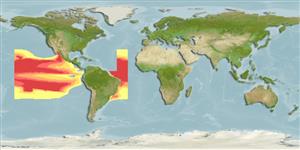Ελασμοβράγχιοι (καρχαρίες και σαλάχια) (sharks and rays) >
Lamniformes (Mackerel sharks) >
Odontaspididae (Sand tiger sharks)
Etymology: Odontaspis: Etymology not explained, presumably odontos (Gr.), tooth, and aspis (Gr.), shield, perhaps referring to how teeth comprise a prominent narrow cusp provided with two or more small “side teeth” (translation), i.e., cusplets, which, with some imagination, could be said to “shield” the main cusp; another explanation: aspis (L.), viper, perhaps referring to outwardly pointing teeth of O. ferox, like that of a viper (See ETYFish); noronhai: In honor of Adolfo César de Noronha (1873-1963), late director of the Funchal Museum (Madeira), where holotype is housed (See ETYFish).
Eponymy: Adolfo César de Noronha (1873–1963) was a naturalist and librarian who was Director of the Funchal Museum in Madeira (where the type specimen of the shark is housed). [...] (Ref. 128868), visit book page.
Environment: milieu / climate zone / depth range / distribution range
Οικολογία
Θαλασσινό(ά); εύρος βάθους 60 - 1000 m (Ref. 10722). Deep-water; 31°N - 34°S, 163°W - 27°W (Ref. 54682)
Eastern Atlantic: Madeira and southern Brazil. Eastern Central Pacific: off Hawaii. May eventually be recorded from the Western Central Pacific (Ref. 13568). Questionably occurring in Seychelles.
Length at first maturity / Μέγεθος / Βάρος / Age
Maturity: Lm 325.0 range ? - ? cm
Max length : 367 cm TL αρσενικό/απροσδιόριστο; (Ref. 247); 326.0 cm TL (female)
Snout conical and bulbous, tip rounded. Eyes large and ovoid, nictitating membrane absent. Body color uniform chocolate brown, all fins except pectorals with thin dark edging along posterior margin.
A deepwater shark inhabiting the continental and insular slopes (Ref. 50449, 58302). Pelagic (Ref. 58302). Ovoviviparous, embryos feeding on yolk sac and other ova produced by the mother (Ref. 50449). Feeding habits unknown.
Life cycle and mating behavior
Γεννητική Ωρίμανση | Αναπαραγωγή | Γεννοβολία | Αβγά | Γονιμότητα | Προνύμφες
Exhibit ovoviparity (aplacental viviparity), with embryos feeding on other ova produced by the mother (oophagy) after the yolk sac is absorbed (Ref. 50449). Distinct pairing with embrace (Ref. 205).
Compagno, L.J.V., 1984. FAO Species Catalogue. Vol. 4. Sharks of the world. An annotated and illustrated catalogue of shark species known to date. Part 1 - Hexanchiformes to Lamniformes. FAO Fish. Synop. 125(4/1):1-249. Rome, FAO. (Ref. 247)
IUCN Red List Status (Ref. 130435: Version 2024-2)
Threat to humans
Harmless
Human uses
αλιεία: με δυνητικό ενδιαφέρον
Εργαλεία
Special reports
Download XML
Διαδικτυακές πηγές
Estimates based on models
Preferred temperature (Ref.
123201): 8.6 - 15.2, mean 12 °C (based on 13 cells).
Phylogenetic diversity index (Ref.
82804): PD
50 = 0.8125 [Uniqueness, from 0.5 = low to 2.0 = high].
Bayesian length-weight: a=0.01122 (0.00514 - 0.02450), b=3.04 (2.87 - 3.21), in cm total length, based on all LWR estimates for this body shape (Ref.
93245).
Τροφικό Επίπεδο (Ref.
69278): 4.4 ±0.4 se; based on size and trophs of closest relatives
Ελαστικότητα (Ref.
120179): Πολύ χαμηλό, ελάχιστος χρόνος για διπλασιασμό πληθυσμού > 14 έτη (Fec assumed to be <10).
Fishing Vulnerability (Ref.
59153): Very high vulnerability (90 of 100).
